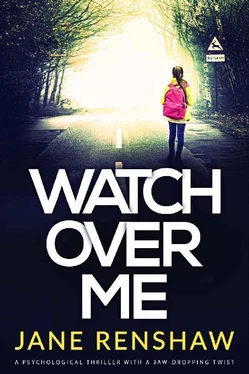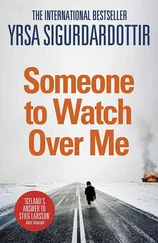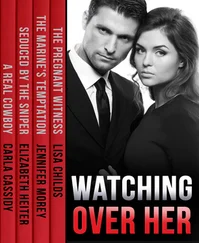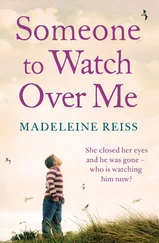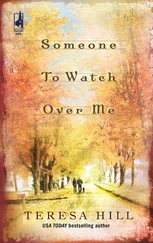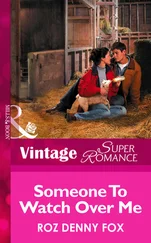She opened the cupboard and grabbed the dustpan and brush.
‘Up. Up .’
He closed the laptop and tucked it under his arm and stood, backing away as she pulled out the chair to get under it.
‘I don’t believe this.’ She swiped at the flagstones, reaching under the table for the outliers, feeling her face going red with the effort.
‘Sorry.’
As she straightened, he put down the laptop and reached to take the dustpan from her, but she pulled away. He was liable to tip the contents over the floor again while emptying it into the bin.
He raised his eyebrows. ‘Don’t you think you’re going a bit overboard with the Stepford stuff? We don’t want the place to say We’re too uptight to be parents .’
She replaced the dustpan in the cupboard and scanned the kitchen. Maybe it was a bit unnaturally pristine. She had decluttered, banishing even the toaster, temporarily, to a drawer. She had sanded and oiled the wooden worktops and arranged a careful collection of objects on them – a matching set of tea, coffee and sugar cannisters in a tasteful sage green enamel, a miniature trug with apples from the garden, a wire-fronted shabby-chic egg cupboard with posh blue, white and speckled-brown eggs inside. She had used baking soda on the Belfast sink after making the scones, so its white porcelain was hospital-bright. The ironed tea towel hanging over the rail of the Rayburn was red and white gingham. There was a basket by the door to the utility room with pine cones in it, for no good reason.
She imagined Deirdre standing here, looking around her, blinking her wistful-angel eyes. Shaking her head. And then turning to Ruth and sighing: Oh, but you see, I’m afraid we know.
She took a long breath, in and out.
She had to pull herself together. Get a grip and concentrate.
The kitchen. Was it okay?
No, actually. Alec was right. It wasn’t a kitchen any child would be comfortable in.
‘Oh God. It is Stepford!’
‘It’s fine. Here…’ He opened the fridge and took out the butter. Then a side plate from the neat stack in the cupboard, and a knife from the drawer. He smeared the knife across the butter and set it on the plate, and the plate on the worktop next to the sink, as if someone had just had a scone and left the plate there.
‘There would be crumbs on the plate,’ she said.
He picked a few off the bottom of one of the scones – she’d have to remember which one, so she didn’t give it to Deirdre – and scattered them on the plate.
‘And maybe you could get some papers from the study and leave them lying somewhere in the sitting room? And maybe here on the table…’
‘Ruth. Relax, for God’s sake. I don’t know what you’re so worried about. It’s going to be a breeze. What more perfect mother is there than a paediatric nurse?’
For a long moment she couldn’t say anything. She just couldn’t.
And now he was looking at her oddly, questioningly, a little anxiously.
She puffed out a big exasperated sigh. ‘It’s not me I’m worried about.’
Of all the lies she had ever told him, this might just be the biggest.
But, as his mum would have said, that put his gas at a peep.
And he really had been a bit of a liability from the word go, from the very first session of the Preparation Course, in that airless little room with the fluorescent lighting and the awful faded posters – a close-up of a child’s hand held in an adult’s; a blurred child playing in a garden; a sad-faced boy sitting on a step with lost-waif eyes lifted to the camera…
Alec had found that one particularly amusing. He’d said to Ruth, without bothering to lower his voice: ‘Reckon the same outfit does the SSPCA and homeless stuff – add a bald dog and a Big Issue seller and you’ve got the set.’
There had been four other couples on the course. They’d all sat in a circle on moulded red plastic chairs while Ben the tutor, a whispery, I’m-so-caring type, made them introduce themselves.
While the others spoke, often tearfully, about why they were there, to gentle nods of encouragement and ‘ Mmm, mmm ’s from Ben, Ruth had found her gaze returning to the poster of the little waif. Which was ridiculous. He was a child model. He had a family, a family who were perfectly nice, probably, when they weren’t exploiting his Oliver Twist qualities to make a quid or two. But she knew, if she and Alec ‘got through’ and ever had to make ‘the choice’ (she was already picking up the jargon), that she was going to be forever haunted by the faces of the children they didn’t take. How did you turn the page on a desperate child? How did you decide that you didn’t want to love him, consigning him to God knows what?
Because she already knew that she wanted a little girl.
She hadn’t told Alec, but their child was going to be a little girl. She was out there somewhere, a little lost soul, waiting for Ruth to find her. Waiting for Ruth to love her.
Ben had started murmuring at them about how the children could be expected to have developmental delays and challenging behaviour because of what they’d been through.
‘How do you think you’d address that?’
No no no don’t ask Alec , she’d prayed.
But of course he’d asked Alec.
People always warmed to Alec. There was a gauche friendliness about him that lulled them into a false sense of security. And his skinny little childlike geeky frame, thin arms poking from his T-shirt, made people feel protective.
‘Alec?’
Alec had sat back in his chair and pushed his feet out and frowned, considering, and then he’d come out with it: ‘Well, I don’t know that there would be much I could do to address that . Developmental delay and behavioural problems are likely to be down to things like foetal alcohol syndrome, foetal complications of heroin addiction, genetically inherited conditions… the list goes on. Just for instance – up to a fifth of adopted children have some sort of foetal alcohol disorder, which can produce a small head and brain, learning disabilities, epilepsy… autism, ADHD, horrendous behavioural issues… And as for genetic conditions, it’s been estimated that about half of single parents with serious psychiatric illnesses lose custody of their children. That means that a high proportion of children up for adoption will be at risk of having inherited a mental health condition from one or both parents. Bipolar disorder has a heritability of seventy-five per cent. Schizophrenia, eighty-one per cent.’
Ben opened his mouth.
Alec held up a hand. ‘Now, when I say heritability , that doesn’t mean that a child of someone with schizophrenia has an eighty-one per cent chance of inheriting it. It means that eighty-one per cent of variation in the presence or absence of the condition can be attributed to genetics.’
Ruth could feel her face going bright red. She made her voice light. ‘Alec… I don’t think anyone is interested in a lecture on genetics?’ And she giggled; a high, nervous, slightly manic sound.
Maybe they would think that she had a mental illness? Maybe they would think that was why Alec knew so much about it? Maybe Ben would pass on his concerns to his boss and they’d decide to look at Ruth a bit more closely?
‘No, but…’ One of the other men was rubbing his chin with the back of his hand. ‘I hear what you’re saying, Alec. These mothers who give up their kids, or have them removed… You gotta wonder what’s at the root of that. You gotta wonder whether – You know, they’re often not the sharpest pencils in the box either…?’
His partner, a neat corporate type in a grey designer trouser suit, was staring at him in horror. He gave her a placating grimace.
Читать дальше
